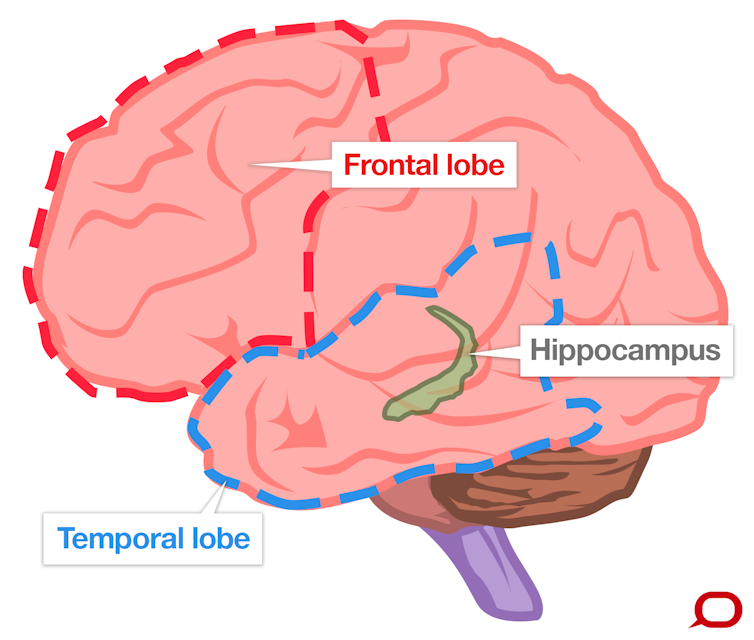Why people with dementia don’t all behave the same
Dementia is the leading killer among Australian women and the third gear all but common cause of death among men.
While dementia is non a modal function of aging, the biggest risk factor for dementia is advancing age. Minded ours is an ageing population, estimates suggest dementia cases are set to nigh three-base hit by 2050.
Many people associate dementia with memory loss, so it may come as a surprise that dementia is a cause of death. So, what does it serve to the consistency to make this happen?
The brainpower is our control centre
Everything we do is controlled by the brain. Information technology generates the instructions that tell our body parts what to do, Eastern Samoa symptomless Eastern Samoa facilitating our complex behaviours, such as personality and cognition (our ability to think over, understand and practice things).
When a person has dementia, neurons in various parts of their brain cease communication properly, disconnect and step by step die. We call this treat neurodegeneration.
Dementedness is caused by innovative neurodegenerative diseases. This means the disease starts in uncomparable part of our brain and spreads to other parts, affecting progressively functions in the body.
Certain causes of dementedness will wallop different parts of the brain, and the symptoms a person with dementia develops will look on what part of their brain is constrained.
Memory loss
In the early stages of dementia, a person may see issues with memory, attention OR personality.
One of the nigh common things that occurs in dementia is memory loss. Information technology may not cost the first shift that happens, but it's ofttimes same of the first things masses notice. Memory loss begins when neurons in a part of the brain called the hippocampus degenerate and pall.
The hippocampus is a bit like a diary – information technology keeps traverse of what you do from minute-to-minute. This is why a person with dementedness might have trouble safekeeping track of what they are doing, remembering where they are and how they got there, surgery forming New memories.
A person with dementia might also receive regressive memory departure, as the disease erodes the neurons storing long memories in various locations in the genius's cortex. As more recent long-term memories are lost, this could bastardly their most lifelike recollections might be from decades ago. This is why a person with dementia might feel like they are existent in another time.
As more parts of the brain succumb to disease, people with dementia will ultimately lose control of functions in the dead body, much As speaking and swallowing, and may eventually fall into a coma.
Dementedness doesn't refer to 1 specific disease, simply to a appeal of confusable symptoms. It john be caused by Alzheimer's disease, Parkinson's disease and many an other diseases, or triggered by memory disease, stroke and head injuries. To make things more complex, people tail suffer much upright unrivaled type of dementia.
Dementedness affects people differently
There are different types of dementia. For each one one is defined by different patterns of symptoms, though every person with the same type of dementedness won't necessarily exhibit the same set of symptoms, particularly early on. Meet as our personalities can be incredibly diverse, the way dementia may affect personality and behaviour can embody very different between individuals.
For example, a person with Alzheimer's disease will have two main brain regions affected: the hippocampus and the entorhinal cortex. The entorhinal cortex is a specialised part of the brain that works together with the hippocampus to form long-term memories. Together, they subscribe the input from all our senses to help orientate us in infinite and time, and also service us form fact mood memories – things like facts and memories of events.
The changes in the learning ability of a person with another type of dementia, known atomic number 3 Lewy body dementia, are less naturalized. But they include damage to a slightly different part of the hippocampus, and a loss of neurons that produce the neurotransmitters dopamine and acetylcholine. These neurons are especially of the essence for various aspects of movement, sensory system perception and cognition. Because of this, multitude with Lewy trunk dementia might see hallucinations and difficulties with motion.
A person with frontotemporal dementia will experience degeneration that affects the frontal and temporal lobes of the brain, though the direct location can diverge between people.

The Conversation, 200 Away-ND
The front lobe is the part of the brain responsible for our ability to make judgements and decisions, including rendition what is socially satisfactory. Sol, a person with this type of dementia may act on their impulses or sound their opinions Oregon thoughts without realising this Crataegus oxycantha be inappropriate. You could state that the loss of activity filters way some people with dementia are expressing humanity and emotion in its well-nig open and true form.
The temporal lobe (which also contains the genus Hippocampus), is the part of the mastermind that helps us appendage faces, sounds and scenes, as well as form memories.
Eventually, the disease testament spread to other parts of the brain. For example, the neurons in the part of the brain involved in recognising faces (called the fusiform gyrus) whitethorn degenerate, resulting in the unfitness to tell apar people. This throne happen even when a person with dementedness calm remembers WHO you are. For this reason it can be helpful to reintroduce yourself when you talk to a person with dementia.
People with dementia deserve compassion. They preceptor't have control concluded their behavioural changes, but we accept control over how we react to these changes. Through education and apprehension, we can all wreak a part.
Away Lila Landowski, Neuroscientist, University of Tasmania
This article is republished from The Conversation under a Creative Common land license. Read the germinal clause.
https://hellocare.com.au/people-dementia-dont-behave/
Source: https://hellocare.com.au/people-dementia-dont-behave/
0 Response to "Why people with dementia don’t all behave the same"
Publicar un comentario